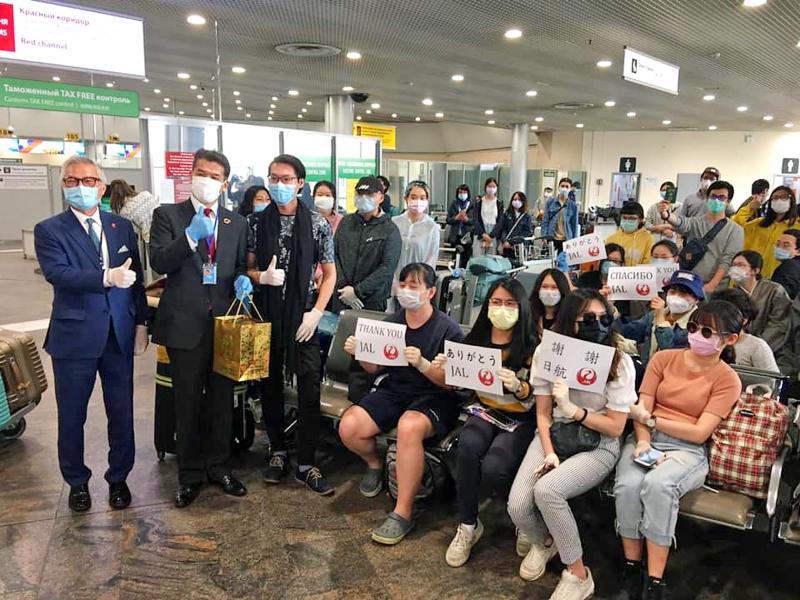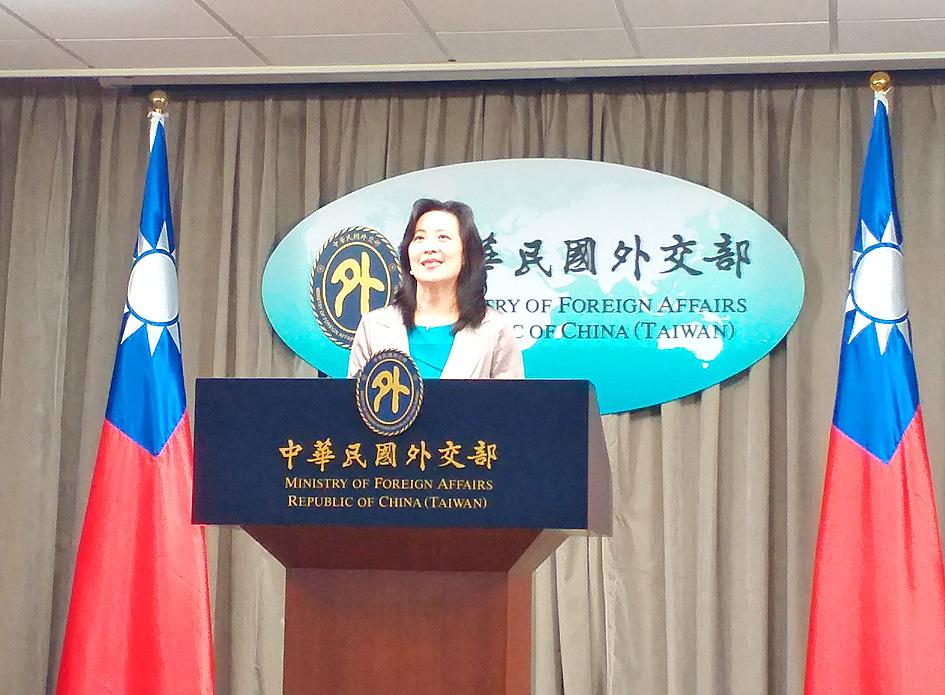The Ministry of Foreign Affairs yesterday thanked Japan for allowing 94 Taiwanese on a chartered plane evacuating others stranded in Russia, where COVID-19 cases are rising and many international flights have been canceled.
Ninety-four Taiwanese exchange students and expats, as well as two Russian spouses, arrived at Narita International Airport in Japan yesterday morning on a charter flight operated by Japan Airlines, before taking a transfer flight to Taiwan Taoyuan International Airport last night, ministry spokeswoman Joanne Ou (歐江安) said.
As of press time last night, Russia had reported more than 362,000 cases of COVID-19, including more than 3,800 deaths.

Photo courtesy of the Representative Office in Moscow
The government had since earlier this month been seeking ways to evacuate the trapped Taiwanese before Japan agreed to arrange seats for them on a charter flight evacuating 47 Japanese nationals from Russia.
The high cost had kept Taiwan from sending its own charter flight, Ou said.
The ministry expressed its sincere appreciation to Japan, as well as Russia, for all of the arrangements they made for the evacuation, she added.

Photo: CNA
The 96 evacuees would be placed in centralized quarantine, in line with the Central Epidemic Command Center’s disease prevention regulations, Ou said.
The Taipei Economic and Cultural Representative Office in Japan also extended special thanks to Japan Airlines and the Japanese All-Party Parliamentary Group for Taiwan for their efforts in coordinating the flight, Representative to Japan Frank Hsieh (謝長廷) said.
Speaking at a regular news conference in Japan, Japanese Chief Cabinet Secretary Yoshihide Suga said that the successful evacuation is a great example of collaboration between Japan, Taiwan and Russia during the disease prevention period.
Japanese authorities assisted the evacuees, ensuring that they had a smoother experience getting a connecting flight back to Taiwan, Suga said.
Japan Airlines had reportedly planned to land the flight at Tokyo Haneda Airport, but changed the destination to Narita International Airport, which has direct flights to Taiwan.
Suga expressed appreciation for the 1 million masks that KGI Charity Foundation (凱基慈善基金會) chairman Angelo Koo (辜仲瑩) donated to Japan, as well as thanking Taiwanese for their various forms of support.

Intelligence agents have recorded 510,000 instances of “controversial information” being spread online by the Chinese Communist Party (CCP) so far this year, the National Security Bureau (NSB) said in a report yesterday, as it warned of artificial intelligence (AI) being employed to generate destabilizing misinformation. The bureau submitted a written report to the Legislative Yuan in preparation for National Security Bureau Director-General Tsai Ming-yen’s (蔡明彥) appearance before the Foreign Affairs and National Defense Committee today. The CCP has been using cognitive warfare to divide Taiwanese society by commenting on controversial issues such as Taiwan Semiconductor Manufacturing Co’s (TSMC, 台積電) investments in the

INVESTIGATION: The case is the latest instance of a DPP figure being implicated in an espionage network accused of allegedly leaking information to Chinese intelligence Democratic Progressive Party (DPP) member Ho Jen-chieh (何仁傑) was detained and held incommunicado yesterday on suspicion of spying for China during his tenure as assistant to then-minister of foreign affairs Joseph Wu (吳釗燮). The Taipei District Prosecutors’ Office said Ho was implicated during its investigation into alleged spying activities by former Presidential Office consultant Wu Shang-yu (吳尚雨). Prosecutors said there is reason to believe Ho breached the National Security Act (國家安全法) by leaking classified Ministry of Foreign Affairs information to Chinese intelligence. Following interrogation, prosecutors petitioned the Taipei District Court to detain Ho, citing concerns over potential collusion or tampering of evidence. The

‘COMPREHENSIVE PLAN’: Lin Chia-lung said that the government was ready to talk about a variety of issues, including investment in and purchases from the US The National Stabilization Fund (NSF) yesterday announced that it would step in to staunch stock market losses for the ninth time in the nation’s history. An NSF board meeting, originally scheduled for Monday next week, was moved to yesterday after stocks plummeted in the wake of US President Donald Trump’s announcement of 32 percent tariffs on Taiwan on Wednesday last week. Board members voted to support the stock market with the NT$500 billion (US$15.15 billion) fund, with injections of funds to begin as soon as today. The NSF in 2000 injected NT$120 billion to stabilize stocks, the most ever. The lowest amount it

NEGOTIATIONS: Taiwan has good relations with Washington and the outlook for the negotiations looks promising, Minister of Economic Affairs J.W. Kuo said Taiwan’s GDP growth this year is expected to decrease by 0.43 to 1.61 percentage points due to the effects of US tariffs, National Development Council (NDC) Minister Paul Liu (劉鏡清) said at a meeting of the legislature’s Economics Committee in Taipei yesterday, citing a preliminary estimate by a private research institution. Taiwan’s economy would be significantly affected by the 32 percent “reciprocal” tariffs slapped by the US, which took effect yesterday, Liu said, adding that GDP growth could fall below 3 percent and potentially even dip below 2 percent to 1.53 percent this year. The council has commissioned another institution